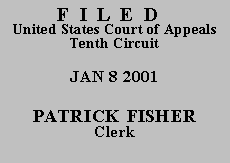

|
CHARLES ANTHONY GOLDEN, |
|
Before BRORBY, KELLY, and MURPHY, Circuit Judges.
This case is before the court on Charles Anthony Golden's pro se request for a certificate of appealability ("COA").(1) Golden seeks a COA so that he can appeal the district court's denial of his 28 U.S.C. § 2241 petition.(2) In his § 2241 petition, Golden challenged as unconstitutional the actions of Oklahoma prison officials in resetting his parole hearing date based on the newly-enacted Truth in Sentencing Act. The matter was referred to a magistrate judge for initial proceedings pursuant to 28 U.S.C. § 636(b)(1)(B). The magistrate judge issued a comprehensive report and recommendation, concluding as follows: (1) each of Golden's three claims were time barred under the provisions of 28 U.S.C. § 2244(d)(1); (2) Golden had not identified any circumstances that would entitle him to equitable tolling and no such circumstances were apparent; and (3) Golden's second and third claims, which claims related to alleged deficiencies in Oklahoma's post-conviction procedures, failed to present a viable habeas claim, see Sellers v. Ward, 135 F.3d 1333, 1336 (10th Cir.), cert. denied, 525 U.S. 1024 (1998). Upon de novo review, the district court adopted the report and recommendation and dismissed Golden's petition with prejudice.
Golden is entitled to a COA only upon making a "substantial showing of the denial of a constitutional right." 28 U.S.C. § 2253(b)(2). He can make this showing by demonstrating that the issues raised are debatable among jurists, a court could resolve the issues differently, or that the questions presented deserve further proceedings. See Slack v. McDaniel, 120 S. Ct. 1595, 1603-04 (2000). This court has reviewed Golden's request for a COA and accompanying brief and has conducted a de novo review of the magistrate judge's report and recommendation, the district court's order, and the entire record on appeal. That close review reveals that the district court's resolution of Golden's petition is not debatable or deserving of further proceedings. Accordingly, this court DENIES Golden's request for a COA for substantially those reasons set forth in the magistrate judge's report and recommendation dated August 15, 2000, and the district court's order dated August 31, 2000. Golden's appeal is, therefore, DISMISSED. See 28 U.S.C. § 2253(c).
ENTERED FOR THE COURT:
Michael R. Murphy
Circuit Judge
*. This order and judgment is not binding precedent, except under the doctrines of law of the case, res judicata and collateral estoppel. The court generally disfavors the citation of orders and judgments; nevertheless, an order and judgment may be cited under the terms and conditions of 10th Cir. R. 36.3.
1.The court also has before it Golden's omnibus request that the appellate filing fee be refunded and that he be allowed to proceed in forma pauperis. After the district court denied Golden's request to proceed in forma pauperis on appeal, Golden simply paid the filing fee in full. Golden then filed in this court a motion requesting that this court order the district court to refund the fee. Golden has not identified any precedent supporting such a request and this court has not discovered any. Accordingly, Golden's request that this court order the district court to refund the appellate filing fee is DENIED. His request to proceed in forma pauperis is DENIED as moot.
2.Although Golden identified 28 U.S.C. § 2254 as the appropriate statutory basis for his habeas corpus petition, the district court correctly noted that the petition was actually brought pursuant to 28 U.S.C. § 2241. This is so because the petition attacks the execution of Golden's sentence rather than the validity of his conviction. See Montez v. McKinna, 208 F.3d 862, 864-65 (10th Cir. 2000) (discussing distinction between § 2241 and § 2254 petitions).